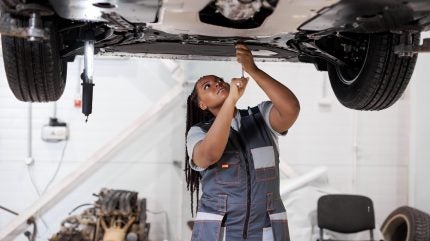
June 30th, 2024, marked National Girls in Automotive Day; a day to promote the automotive industry and career opportunities within it. As we currently stand, women are very underrepresented in the industry, making up less than 20% of the UK’s automotive sector workforce.

Discover B2B Marketing That Performs
Combine business intelligence and editorial excellence to reach engaged professionals across 36 leading media platforms.
This low statistic is surprising considering the industry is suffering from an ongoing shortage of skilled professionals, predicted to amount to over 160,000 vacancies by 2031.
Frankie Youd spoke with Irene Castelanotti, Digital Business Director at Autodata, to learn more about the day and to discuss if the tide for female mechanics is shifting.

Just Auto (JA): What is National Girls in Automotive Day, and what is its importance?
Irene Castelanotti (IC): ‘National Girls in Automotive Day’ is a yearly awareness day celebrating the incredible women working in the automotive industry in the UK.
While some progress has been made, women still currently only make up 20% of the automotive workforce, lagging behind so many other industries. For example, other traditionally male dominated industries like the science industry now have 44% of the industry comprised of women. This is thanks to a concerted effort to encourage more females to enter the profession.
Whilst we have already supported this event, it doesn’t mean encouraging more people into the industry stops. Women should be recognised in this incredible industry all year long, and I won’t stop supporting this cause until we see greater representation.
Why do you think that women only make up less than 20% of the UK’s automotive workforce?
I see two main issues at play here. Firstly, the failure of industry professionals to empower young women. Despite the great work of the 30% Club in recent years to increase gender diversity, many still view the industry as male-dominated due to the lack of celebrated female leaders.
Secondly, this industry fails to promote the extensive range of roles in the automotive industry. Technological innovations mean the industry is going through the largest transformation in history. The workforce requires a larger variety of talent with a broader range of skills than it did even just ten years ago. These roles can range from AI experts to scientists developing future generations of EV batteries.
Many still view the industry as male-dominated due to the lack of celebrated female leaders.
We must challenge the common misconception that the automotive industry consists only of all-male mechanics tightening bolts and highlight the extraordinary breadth of roles available.
What challenges do technicians face in keeping up with ever complex repairs?
Cars are modernising. With this, there is more demand for tasks involving software updates and car upgrades. These new tasks require a fresh set of skills – ones that blend technical expertise with creative problem-solving.
A fresh set of skills does not require a new workforce. Garage owners should invest in the skills of their current technicians, this is a significantly more cost-effective approach than repeatedly onboarding new hires.
Another solution to these challenges is implementing software designed to support mechanics and vehicle technicians. Autodata, for instance, can provide information on the specific tools required for each vehicle model to help manage and streamline repairs.
Responsibility should not rest solely on the workshops. A collective effort is required to address this skills gap and ensure the workforce is equipped to meet the new demands of the automotive industry.
Is the tide for female mechanics shifting?
The very celebration of Girls in Automotive Day shows the tide is shifting for females in the automotive industry. But this shift is slow, and we need to find ways to speed it up.
Organisations are waking up to the fact that diverse teams perform better. Technology enables success, but good performance starts with a business’s people, their peers, and their teamwork. With research showing that gender-diverse and inclusive teams outperform gender-homogenous teams by as much as 50%, the benefits of closing the gender gap in the automotive industry are undeniable.
Role models and support networks for women in or entering the industry will further catalyse this trend. Currently, many of the established European and North American OEM brands have women on their senior management teams. These women serve as vital role models, demonstrating that women can and do reach the top in traditionally male-dominated industries.
Finally, platforms like the Women Automotive Network, where people can meet and hear from women of all levels from all kinds of backgrounds and domains, act as further inspiration that the automotive industry is a supportive environment for women.
What else is needed to further support growth of women entering the industry?
Inclusive and approachable apprenticeship schemes are necessary to support the continued growth of women entering the industry.
The great news is advertising for apprentices in the automotive space has continued to grow since 2020, with job postings increasing by more than double since 2021, according to the Institute of the Motor Industry.
Although much work remains, the situation is always improving, and everyone can play a role in accelerating this progress. We can share our stories, offer support to those in need, provide advice to one another, and, as leaders, make sure to actively cultivate workplace cultures and communities that support women.
Inclusive and approachable apprenticeship schemes are necessary to support the continued growth of women entering the industry.






